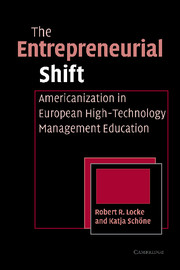Book contents
- Frontmatter
- Contents
- List of illustrations
- Acknowledgements
- List of abbreviations
- Introduction
- 1 Phenomenal Silicon Valley and the second Americanization
- 2 American management education: adding the entrepreneurial dimension
- 3 Adjusting higher education in France and Germany to a post-1945 world
- 4 Creating German and French entrepreneurship studies
- 5 Networking for high-tech start-ups in Germany and France
- 6 The Czech Republic: an arrested development
- 7 Conclusions and policy recommendations
- References
- Index
Introduction
Published online by Cambridge University Press: 10 December 2009
- Frontmatter
- Contents
- List of illustrations
- Acknowledgements
- List of abbreviations
- Introduction
- 1 Phenomenal Silicon Valley and the second Americanization
- 2 American management education: adding the entrepreneurial dimension
- 3 Adjusting higher education in France and Germany to a post-1945 world
- 4 Creating German and French entrepreneurship studies
- 5 Networking for high-tech start-ups in Germany and France
- 6 The Czech Republic: an arrested development
- 7 Conclusions and policy recommendations
- References
- Index
Summary
In this introduction we wish to do three things: first, to discuss the subject and its importance; second, to look at how we, as historians, approach “Americanization”; and, finally, to sketch out our scheme of presentation.
The subject
This book investigates the impact of the information revolution on the form and content of management education, first in the United States of America, where IR initially flourished, and then in Europe, to where it – in varying different degrees – spread. We call the educational innovation “the entrepreneurial shift.”
The importance of the shift
In order to mark the significance of this shift, we seize on Friedrich Nietzsche's mythopoetic vision of Dionysus and Apollo because their conflicting attributes sum up, in a powerful and timeless metaphor, the states of human consciousness that produced the striking transformation the book describes. In his study of Young Nietzsche, Carl Pletsch observed that, for Nietzsche, the Apollonian “is the principle of clearly delineated images, permanence, optimism, individuation, and rationality. It is striving for clarity.” This is the ethos of classical American corporate management. On the other hand, for Nietzsche, the Dionysian expresses “the principle of flux, impermanence, suffering, and pessimism … an irrational force, impulsive, wild, and instinctive.” This is the creative power behind entrepreneurialism. On a philosophic plain, while Nietzsche “affiliates Schopenhauer's concept of the ‘idea’ or ‘representation’ with Apollo, he associates Dionysus with the ‘will.’”
- Type
- Chapter
- Information
- The Entrepreneurial ShiftAmericanization in European High-Technology Management Education, pp. 1 - 15Publisher: Cambridge University PressPrint publication year: 2004



